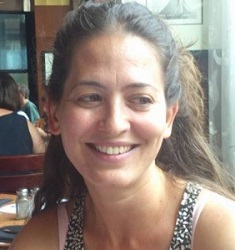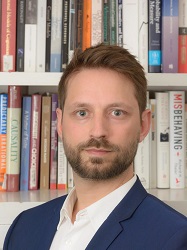Two researchers from the Department of Economics and Business will be able to consolidate their research with EU grants of over a million euros
Two researchers from the Department of Economics and Business will be able to consolidate their research with EU grants of over a million euros
Two researchers from the Department of Economics and Business will be able to consolidate their research with EU grants of over a million euros
Libertad Gonzalez and Gaël Le Mens are to receive Consolidator Grants 2017 from the European Research Council to carry out their projects that focus, respectively, on the effect of public policy on child development and how new patterns of the consumption of information affect personal attitudes.

Libertad González and Gaël Le Mens, lecturers with the Department of Economics and Business at UPF are to receive aid from the European Union to carry out, respectively, and over a five-year period, the projects “The Causal Effect of Public Policy and Income on Child Health and Human Capital” and “The implication of Selective Information Sampling for Individual and Collective Judgments”, both endowed with more than one million euros.
They are part of the total of 329 grants awarded by the European Research Council (ERC) within the Consolidator Grants 2017 call, under the framework of the EU’s Horizon 2020 research and innovation programme. Totalling 630 million euros, these grants are awarded to the best researchers in Europe to carry out projects that can have a huge impact on science and beyond, in order to promote scientific excellence and competitiveness.
The two Pompeu Fabra professors, also linked to the Barcelona GSE, and one of them (Gaël Le Mens) to the Barcelona School of Management (UPF-BSM), are among the eight researchers from universities and research centres in Catalonia and the thirteen in the Spanish State to receive this aid. They will enable them to further their studies and develop their boldest ideas at their own initiative, always with the ultimate goal of improving the lives of European citizens.
How public policies may affect the development of children

Recent studies have documented that a number of impacts (shocks) and early interventions (prenatal and postnatal) in the field of public policy can have major effects on the formation of human capital in the long term (for example, on health or wages). This is the research framework of Libertad González, funded with nearly 1.4 million euros, which will focus on the years between infancy and adulthood, a period little studied to date. Analysing the effects of these shocks, comparing the effects according to the type of shock and intervention at different ages, or finding out which is the most cost-effective way to improve future results for children are the key aspects of her research.
Professor González will use various natural experiments conducted in Spain, for which there is high quality administrative data available for the past 35 years, such as hospital records and school grades. These data will be processed based on state-of-the-art econometric techniques, combined with very large samples, which will enable assessing the causal effects of a series of public policies and their impact on child development. The impacts that will be considered are those that affect the material resources of the home (such as an allowance or benefit for the mother); the time devoted by the father (if he receives subsidized leave, for example); medical treatment around birth; the availability of family planning services (access to abortion, etc.) and the aggregated impacts of demand in different economic sectors.
How information consumption patterns shape beliefs and attitudes
 Gaël Le Mens’s project, endowed with a grant of nearly 1.2 million euros, will study the mechanisms that lead to the current polarization of attitudes of social groups, which has led to the rise of nationalism or populist ideologies. Professor Le Mens’s project will combine knowledge of psychology, sociology and economics to understand how to choose information in accordance with beliefs and attitudes. This project is extremely relevant today at a time when the media are rapidly transforming the way people access information.
Gaël Le Mens’s project, endowed with a grant of nearly 1.2 million euros, will study the mechanisms that lead to the current polarization of attitudes of social groups, which has led to the rise of nationalism or populist ideologies. Professor Le Mens’s project will combine knowledge of psychology, sociology and economics to understand how to choose information in accordance with beliefs and attitudes. This project is extremely relevant today at a time when the media are rapidly transforming the way people access information.
Social media mean that people are more exposed to news sources that match their views, and on the other hand, allow easily avoiding any information that questions or goes against them. Gaël Le Mens will explain how information consumption patterns provided by the new social media affect individual and collective attitudes. The results of this research will help to understand phenomena ranging from the impact of fake mews to the persistence of negative stereotypes about different social groups.
Researchers of 39 nationalities working in 22 different countries
The other Catalan researchers that have received Consolidator Grants in the 2017 call are Fyodor Kondrashov, of the Center for Genomic Regulation (CRG) in Barcelona, in which UPF participates; Francisco Cazorla and Carlos Pérez García-Pando, of the National Supercomputing Centre in Barcelona; Ismael Díez and Anna Alberni, of the University of Barcelona; and Victoria Reyes García, of the Autonomous University of Barcelona.
The ERC has evaluated 2,538 research proposals, 13% of which have been chosen for funding. The subsidies (32% have been awarded to women) will enable creating 2,000 jobs for doctoral and post-doctoral students and other staff working in the corresponding research teams. Researchers of 39 nationalities have received funding, including German (55 funded projects), Italian (33), French (32) and British (31). The recipients will conduct their research projects at universities and research centres in 22 countries across Europe, with Britain being the most prominent location.
